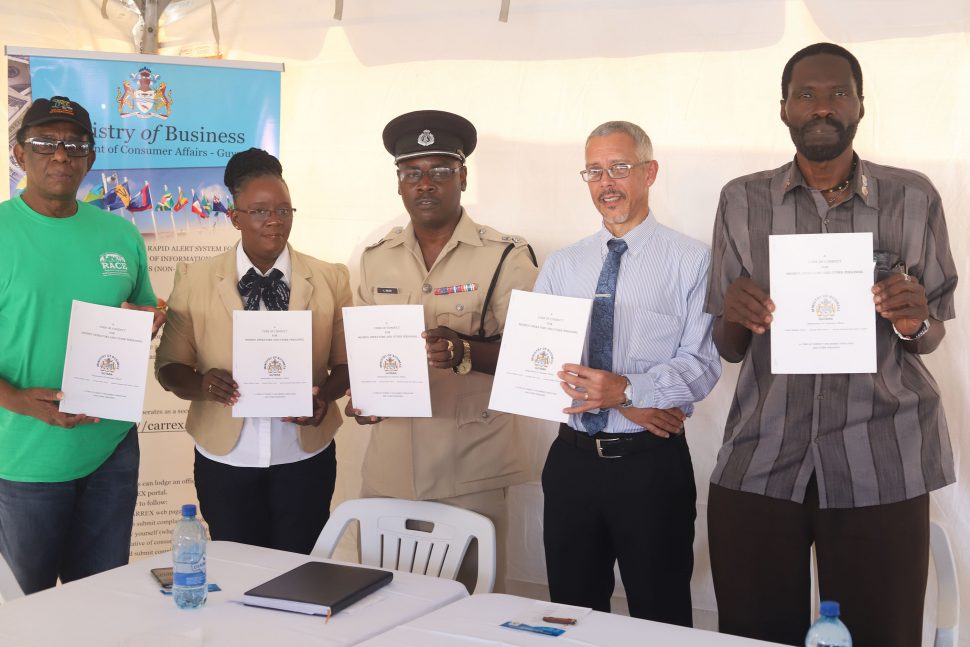A code of conduct containing guidelines for minibus operators offering public transportation services was officially launched yesterday at the Stabroek Market Square by the Ministry of Business.
The objective of the long-awaited code is to improve the quality, safety and efficiency of public transportation in Guyana, and to make the public transport system accessible to all commuters on a non-discriminatory basis.
The code emphasises that the transportation services are a critical sector of the economy and, therefore, it should be operated in a professional manner.
The code was signed by Muriel Tinnis, Director of the Consumer Affairs Department within the ministry, President of the United Minibus Union Eon Andrews, Deputy Chairman of the Guyana National Road Safety Council Earl Lambert, and Traffic Chief Linden Isles in the presence of Minister of Business Dominic Gaskin.
In addition to the launch of the code, Tinnis yesterday also announced that the ministry has reexamined the fare structure implemented last year and has made the decision to reduce fares for short drops to $80. She explained that within the first three miles of the route, commuters will be required to pay $80 and the full fare for anything beyond. She explained that they have recognised operators charging the full fare for short drops.
Last November, after consultations with the minibus union, the ministry agreed to a $20 fare increase, which was a move that was welcomed by bus operators.
Commuters have for years complained bitterly about the non-professional services provided by minibus operators.
With the signing of the code, minibus operators are expected to abide by the guidelines which prohibit loud and offensive music, offensive language, discrimination against the elderly, persons with disabilities, and non-nationals. It also mandates the proper display of the fare structure in minibuses.
Operators will be required to wear uniforms, along with an identification badge or card. It was explained that operators of the different routes will be attired in a uniform associated with their routes. The code does not permit operators to refuel their minibuses while commuters are on board.
Further, operators must at all times ensure commuters are comfortable during their journey and should not be rude or disrespectful to commuters.
Gaskin, in addressing the small gathering, said the signing of the code marks the start of the process of reforming the transportation sector.
“I believe many of us know deep down inside have not been performing optimally. The bottom line is our commuters are not getting a good service from this particular sector. We have a long way to go and the implementation, I believe, is the key to an effective code of conduct,” he said.
The minister indicated further that there must be a collaborative approach between the authorities and the operators if they want to achieve the objective of the code of conduct.
“We are not here to beat down on drivers but to assist in tidying up a sector I believe has gotten out of hand… We have rogue elements who need to be brought into line with the laws of Guyana and what is acceptable service to the commuters,” said Gaskin, who added that the service provided by minibus operators is not acceptable. “It has more to do (than) the fares and traffic violations; it is about the general service being delivered. They are paying for a service and expect to get an acceptable service. I don’t think it is acceptable,” he bemoaned.
He indicated that the ministry will soon embark on the creation of a reporting system which will allow commuters to report breaches of the code. Gaskin said that a software application will designed to allow persons to report breaches.
According to the code, operators will be required to attend training sessions as a criteria for renewals of licences and new operations.
Under the health and safety section, operators are required to equip their minibuses with a fire extinguisher and garbage receptacles, ensure that the interior of the minibus is kept clean and tidy and free from foul odours, ensure that the interior of their vehicle does not poses a threat to the safety of passengers, and undertake daily inspection of their vehicles to safeguard against engine and brakes failure.
Meanwhile, Tinnis said that all minibus operators are expected to operate under the code, which comes into effect immediately, albeit with a 30-day grace period for them to adjust to the new guidelines.
From the ministry’s end, she said, it will be fostering educational sessions with drivers and conductors and relate what is expected of them during operating hours.
She also explained that the minibus union is tasked with ensuring the uniformity for operators from the different routes, while the traffic department of the Guyana Police Force will be required to ensure the operators comply with the regulations.
At the launching yesterday, Andrews called on drivers to adhere to the guidelines set out in the code and desist from the “dog eat dog” style of operation. “…Minibus operators and commuters are in a marriage of non-separation until divorce is inevitable…As long as we continue in the same space as transportation service providers and commuters, we must treat each other in a humane and philanthropic manner,” he cautioned.
Andrews further stressed that it is important that the operators adapt to the change being implemented in the sector or their failure will result in them being left behind.






